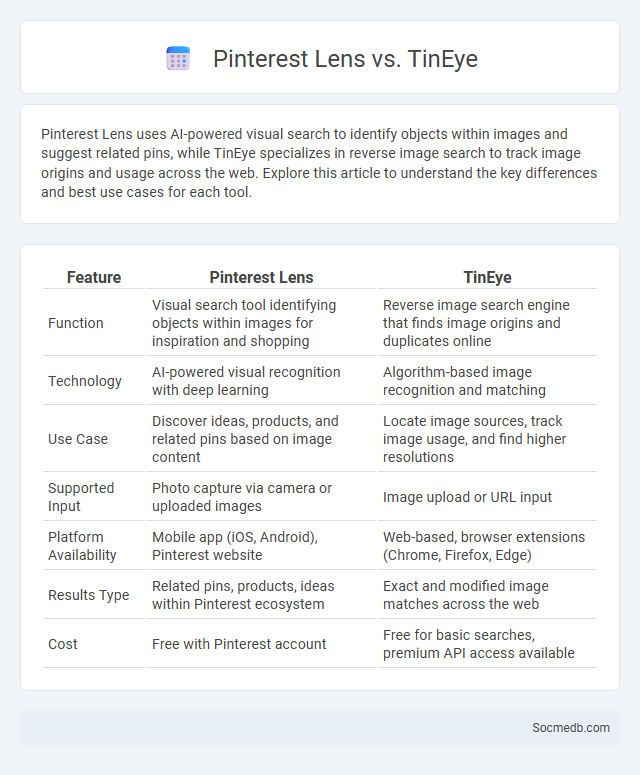
Photo illustration: Pinterest Lens vs TinEye
Pinterest Lens uses AI-powered visual search to identify objects within images and suggest related pins, while TinEye specializes in reverse image search to track image origins and usage across the web. Explore this article to understand the key differences and best use cases for each tool.
Table of Comparison
| Feature | Pinterest Lens | TinEye |
|---|---|---|
| Function | Visual search tool identifying objects within images for inspiration and shopping | Reverse image search engine that finds image origins and duplicates online |
| Technology | AI-powered visual recognition with deep learning | Algorithm-based image recognition and matching |
| Use Case | Discover ideas, products, and related pins based on image content | Locate image sources, track image usage, and find higher resolutions |
| Supported Input | Photo capture via camera or uploaded images | Image upload or URL input |
| Platform Availability | Mobile app (iOS, Android), Pinterest website | Web-based, browser extensions (Chrome, Firefox, Edge) |
| Results Type | Related pins, products, ideas within Pinterest ecosystem | Exact and modified image matches across the web |
| Cost | Free with Pinterest account | Free for basic searches, premium API access available |
Introduction to Visual Search Technologies
Visual search technologies leverage artificial intelligence and image recognition algorithms to enable users to search using images instead of text queries. Social media platforms integrate visual search to enhance user engagement by allowing instant identification of products, places, or people through uploaded photos. This technology optimizes content discovery and personalized recommendations, driving increased interaction and targeted advertising opportunities.
Overview of Pinterest Lens
Pinterest Lens is an innovative visual search tool that allows users to discover ideas and products by simply snapping a photo or uploading an image. It leverages advanced image recognition technology to analyze objects within your picture and provide relevant pins, shopping options, and inspiration. By using Pinterest Lens, your search experience becomes more intuitive and personalized, transforming how you explore creative content.
Exploring TinEye: Key Features
TinEye offers advanced reverse image search technology that allows you to find exact matches of images across the web, providing invaluable tool for social media content verification and copyright protection. Its key features include image recognition, tracking where images appear online, and identifying edited or altered versions, helping users maintain control over their digital content. Your social media strategy can benefit from utilizing TinEye to monitor image usage and discover original sources quickly.
Google Lens: Functionality and Capabilities
Google Lens leverages advanced AI to identify objects, text, and landmarks through a smartphone camera, enabling seamless augmented reality experiences and real-time information retrieval. Its capabilities include text translation, product identification, barcode scanning, and visual search, enhancing user interaction with social media content. Integration with social platforms allows instant sharing and contextual discovery, making Google Lens a powerful tool for enhancing visual communication and engagement.
Image Recognition Accuracy Comparison
Image recognition accuracy in social media platforms significantly impacts content moderation and user experience by enabling precise identification of objects, faces, and contexts within images. Leading platforms leverage advanced artificial intelligence models, with accuracy rates varying from 85% to over 95%, depending on the algorithm complexity and training data volume. Continuous improvements in convolutional neural networks and deep learning frameworks drive enhanced recognition performance, reducing false positives and improving real-time content analysis.
User Experience and Interface Differences
Social media platforms prioritize user experience through intuitive interfaces tailored to specific user behaviors and preferences, enhancing engagement and retention. Variations in design elements such as navigation, content layout, and interactive features directly impact usability, influencing how users consume and share information. Optimizing interface responsiveness and accessibility remains crucial for delivering seamless interactions across diverse devices and user demographics.
Supported Platforms and Accessibility
Social media platforms such as Facebook, Instagram, Twitter, LinkedIn, and TikTok support a wide range of devices including smartphones, tablets, and desktop computers, ensuring seamless user experiences across different operating systems like iOS, Android, and Windows. Accessibility features such as screen readers, voice commands, keyboard navigation, and customizable text sizes are integrated into these platforms to accommodate users with disabilities. Mobile apps and web versions provide synchronized content access, making social media inclusive and user-friendly for diverse audiences worldwide.
Privacy and Data Concerns
Social media platforms collect vast amounts of personal data, raising significant privacy concerns for users. Ensuring your information is protected requires understanding platform privacy settings and being cautious about what you share online. Data breaches and unauthorized data usage highlight the importance of staying informed about social media privacy policies.
Use Cases and Practical Applications
Social media platforms enhance brand awareness by enabling targeted advertising and influencer collaborations, driving customer engagement and lead generation. Businesses utilize social media analytics to track consumer behavior, optimize marketing strategies, and improve customer service through real-time interactions. Educational institutions leverage social media for virtual classrooms, student engagement, and collaborative learning projects, expanding access and fostering community.
Final Verdict: Which Visual Search Tool Wins?
Choosing the best visual search tool depends on your specific needs and platform compatibility, with Pinterest Lens excelling in lifestyle and fashion due to its extensive user-generated content. Google Lens offers unmatched versatility across various categories, providing detailed product information and real-time translations, making it a strong contender for broad applications. Your choice should align with the tool's strengths in accuracy, database size, and integration with your preferred social media environment for optimal results.
 socmedb.com
socmedb.com